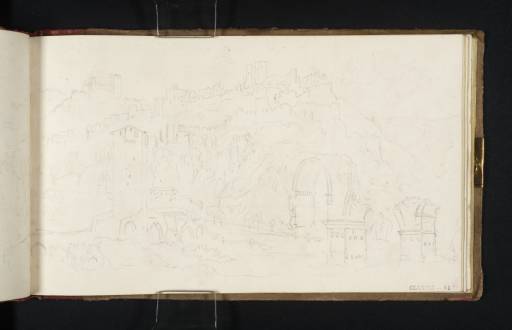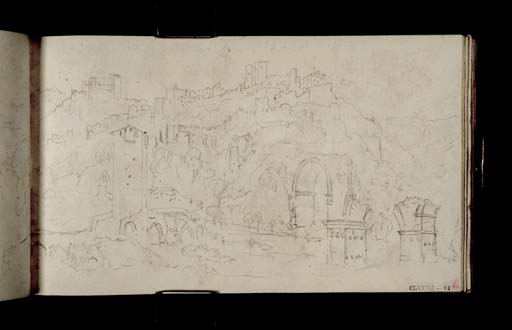Joseph Mallord William Turner Narni from the North-East, with the Medieval and Roman Bridges 1819
Image 1 of 2
Joseph Mallord William Turner,
Narni from the North-East, with the Medieval and Roman Bridges
1819
Joseph Mallord William Turner 1775–1851
Folio 66 Recto:
Narni from the North-East, with the Medieval and Roman Bridges 1819
D14781
Turner Bequest CLXXVII 66
Turner Bequest CLXXVII 66
Pencil on white wove paper, 110 x 186 mm
Inscribed by John Ruskin in red ink ‘66’ bottom right
Stamped in black ‘CLXXVII 66’ bottom right
Inscribed by John Ruskin in red ink ‘66’ bottom right
Stamped in black ‘CLXXVII 66’ bottom right
Accepted by the nation as part of the Turner Bequest 1856
References
1909
A.J. Finberg, A Complete Inventory of the Drawings of the Turner Bequest, London 1909, vol.I, p.523, as ‘Narni; three sketches’.
1984
Cecilia Powell, ‘Turner on Classic Ground: His Visits to Central and Southern Italy and Related Paintings and Drawings’, unpublished Ph.D thesis, Courtauld Institute of Art, University of London 1984, pp. 101, 469 note 143, 103 note 154, 356 note 33.
1987
Cecilia Powell, Turner in the South: Rome, Naples, Florence, New Haven and London 1987, pp.34, 35.
2008
James Hamilton, Nicola Moorby, Christopher Baker and others, Turner e l’Italia, exhibition catalogue, Palazzo dei Diamanti, Ferrara 2008, pp.44, 90 note 29.
2009
James Hamilton, Nicola Moorby, Christopher Baker and others, Turner & Italy, exhibition catalogue, National Galleries of Scotland, Edinburgh 2009, pp.42, 150–1 note 29.
Turner devoted a considerable number of sketches to the Bridge of Augustus (Ponte d’Augusto) at Narni, one of the most famous landmarks in Umbria, see folio 61 verso (D14772). This page depicts part of a view of Narni from the valley to the north-east, with the ruined Roman bridge on the right and the adjacent medieval bridge, destroyed by Allied bombing during the Second World War, on the left. A similar view can be found on folios 64 verso–65 (D14778–9). The sketch recalls John Chetwode Eustace’s description of the ‘romantic appearance’ of Narni in A Classical Tour Through Italy, first published 1813:
The ancient Roman colony of Narni stands on the summit of a very high and steep hill, whose sides are clothed with olives, and whose base is washed by the Nera. At the foot of the hill we alighted to visit the celebrated bridge of Augustus ... All the piers and one arch still remain ... We were particularly struck with the romantic appearance of Narni. Its walls and towers spread along the uneven summit, sometimes concealed in groves or cypress, ilex and laurel, and sometimes emerging from the shade, and rising above their waving tops; delightful views of the vales, towns, rivers and mountains, opening here and there unexpectedly on the eye; a certain loneliness and silence, even in the streets; the consequence and sad memorial of ages of revolution, disaster, and suffering, are all features pleasing and impressive.1
The skyline of the town includes, from left to right: the distinctive square towers of the fourteenth-century Rocca Albornoz; the church and cloister of San Agostino; and the adjacent towers of the convent of San Bernardo and San Domenico. The sketch continues on the opposite sheet of the double-page spread, see folio 65 verso (D14780) and also on folio 67 (D14783), where the artist has folded back the page in order to complete the sketch on the sheet below.
Nicola Moorby
November 2008
How to cite
Nicola Moorby, ‘Narni from the North-East, with the Medieval and Roman Bridges 1819 by Joseph Mallord William Turner’, catalogue entry, November 2008, in David Blayney Brown (ed.), J.M.W. Turner: Sketchbooks, Drawings and Watercolours, Tate Research Publication, December 2012, https://www


